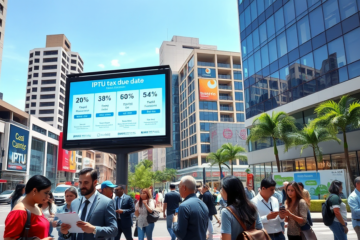US Import Tariffs Reach 30.9%
Import Tariffs have been a crucial issue in trade relations between Brazil and the United States.
This article will explore the impact of new US import tariffs on Brazilian products, which reach a staggering 30.9%.
We will analyze the percentage difference between US and Brazilian tariffs, duty-free exports, and economic projections for Brazil's GDP in 2025 and 2026. We will also address the growth of Brazilian exports to the US and the trade deficit that emerges in this challenging environment.
General Context of the New American Tariffs
The new tariffs imposed by the United States on Brazilian products reveal a significant disparity between the two countries.
The US will apply a rate of 30.9%, almost ten times higher than the average of 2.7% charged by Brazil.
This change represents an increase of 29.6 percentage points compared to the 2024 tariffs.
Projected Impact on Trade Balance and GDP
The increase in US import tariffs on Brazilian products is projected to cause a significant reduction in trade balance from Brazil.
The expectation is that the impact is 0.2% of GDP in 2025, intensifying to 0.4% by 2026.
This effect is exacerbated by the extreme difference between the new American tariff and the average tariff applied by Brazil, creating a substantial obstacle to Brazilian exports.
Non-exempt products, such as fruit and coffee, will have increased difficulties accessing the North American market.
Despite the difficulties, adjustment mechanisms could be explored by Brazil to mitigate some of the adverse effects.
With the help of alternative trading partners and redirecting exports to other countries, it is possible to minimize the impact of tariffs in the long term.
Furthermore, exports that remain exempt, including oil and aircraft, provide much-needed relief, partially offsetting expected losses.
- 0.2% of GDP is expected to be lost in 2025
- 0.4% by 2026
- Potential redirection may mitigate some of the impact
Exemptions and Composition of Exports
The tariff exemption of 43% in Brazilian exports to the United States, with emphasis on oil It is aircraft, represents a significant relief for the country's economy.
These sectors not only ensure a continuous flow of revenue from international trade, but also contribute to maintaining Brazil's competitiveness on American soil.
Furthermore, other sectors of the economy may feel less pressure, softening the effects of the newly imposed tariffs.
According to one Amcham report, the exemption list promotes a field of stability and continuity in commercial transactions.
| Product | Status |
|---|---|
| Oil | Free |
| Aircraft | Free |
| Other Products | Suppressed |
Performance of Brazilian Exports in July
In July, Brazilian exports to the United States grew by 11%, reaching the impressive value of US$ 7.98 billion.
This increase is especially notable in exports of products such as fruit and coffee, which performed significantly during this period.
Despite challenging import tariffs, Brazilian export performance shows resilience and growth potential.
Featured Sectors: Fruits and Coffee
Brazil's fruit and coffee sector is experiencing a remarkable growth in exports to the USA, despite the new tariffs.
Exports increase, driven by diversification strategy and by demand for premium niches in the American market.
Specifically, the US, which imports 30% of Brazilian coffee, found consistent high quality in Brazilian grains, ensuring that the country remains relevant, although there are tariff pressures.
Likewise, the demand for Brazilian fruits, rich in flavor and diversity, has adjusted to new market rules.
Brazilian producers focus on the specific needs of American consumers, finding opportunities in niche markets that value high-quality products, such as mangoes and avocados.
A demand for healthy and nutritious products continues to grow among American consumers, offering Brazil a window to expand its presence even in adverse contexts.
In addition, strategic partnerships and adoption of sustainable practices strengthen the resistance of Brazilian producers in the international market.
Bilateral Trade Deficit in July
Despite a significant increase in Brazilian exports to the United States, Brazil recorded a trade deficit of US$ 559 million with the US in July.
This value reflects an economic situation where, even with the growth of 11% in exports to the American market, driven by products such as fruits and coffee, the trade balance remained unfavorable due to the impact of the new import tariffs imposed by the USA.
These tariffs, reaching 30.9%, are relevant not only because they are ten times greater than those applied by Brazil, but also because they threaten to reduce the competitiveness of Brazilian products in the United States.
Thus, the value of US$ 559 million, in addition to representing a negative figure, signals a pressing challenge in bilateral trade relations.
For more information, visit the InfoMoney website, which provides detailed analysis on this subject.
Import Tariffs pose significant challenges, but also indicate growth in specific sectors.
Analysis of the impact of trade and exports reveals a complex interplay between opportunities and obstacles in relations between Brazil and the United States.



0 Comments